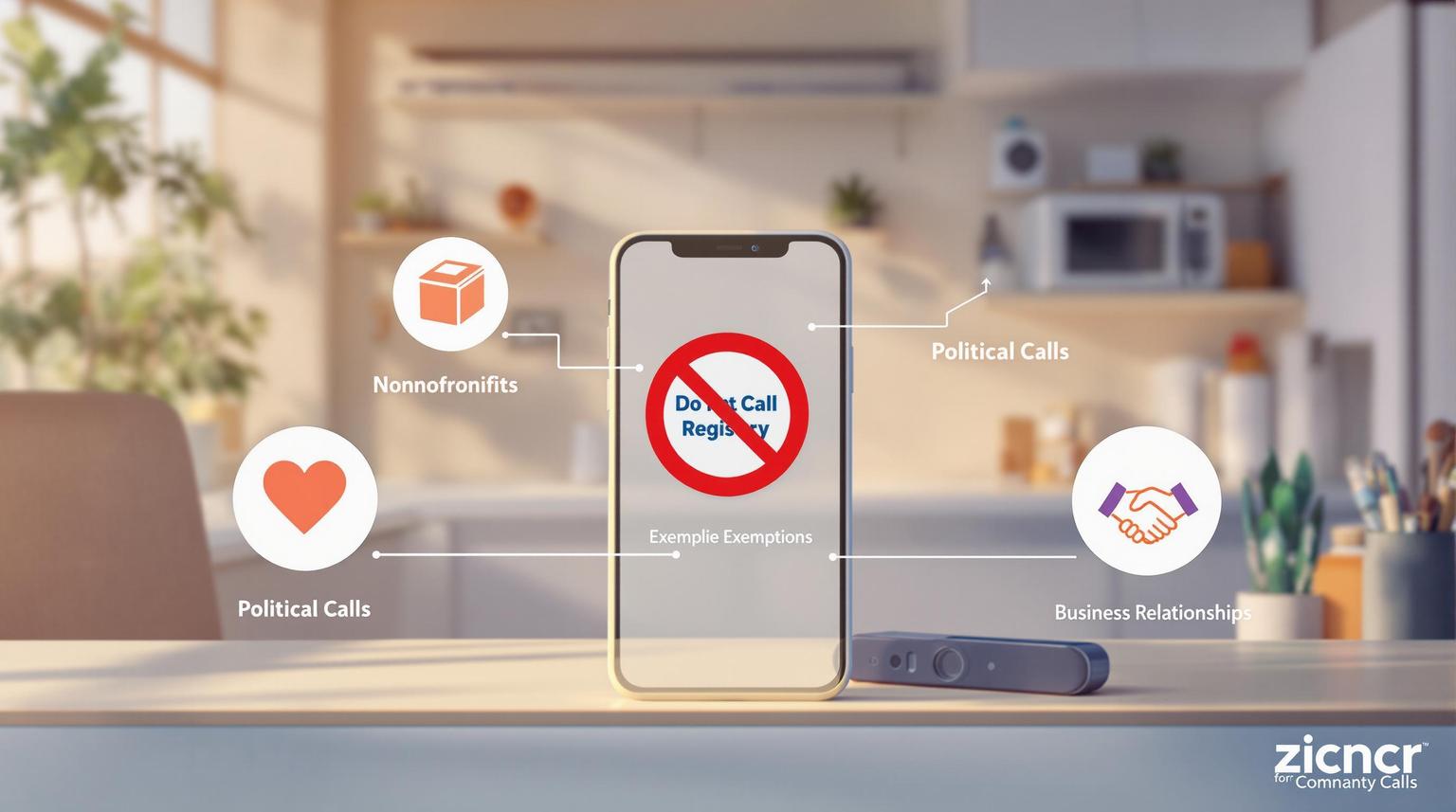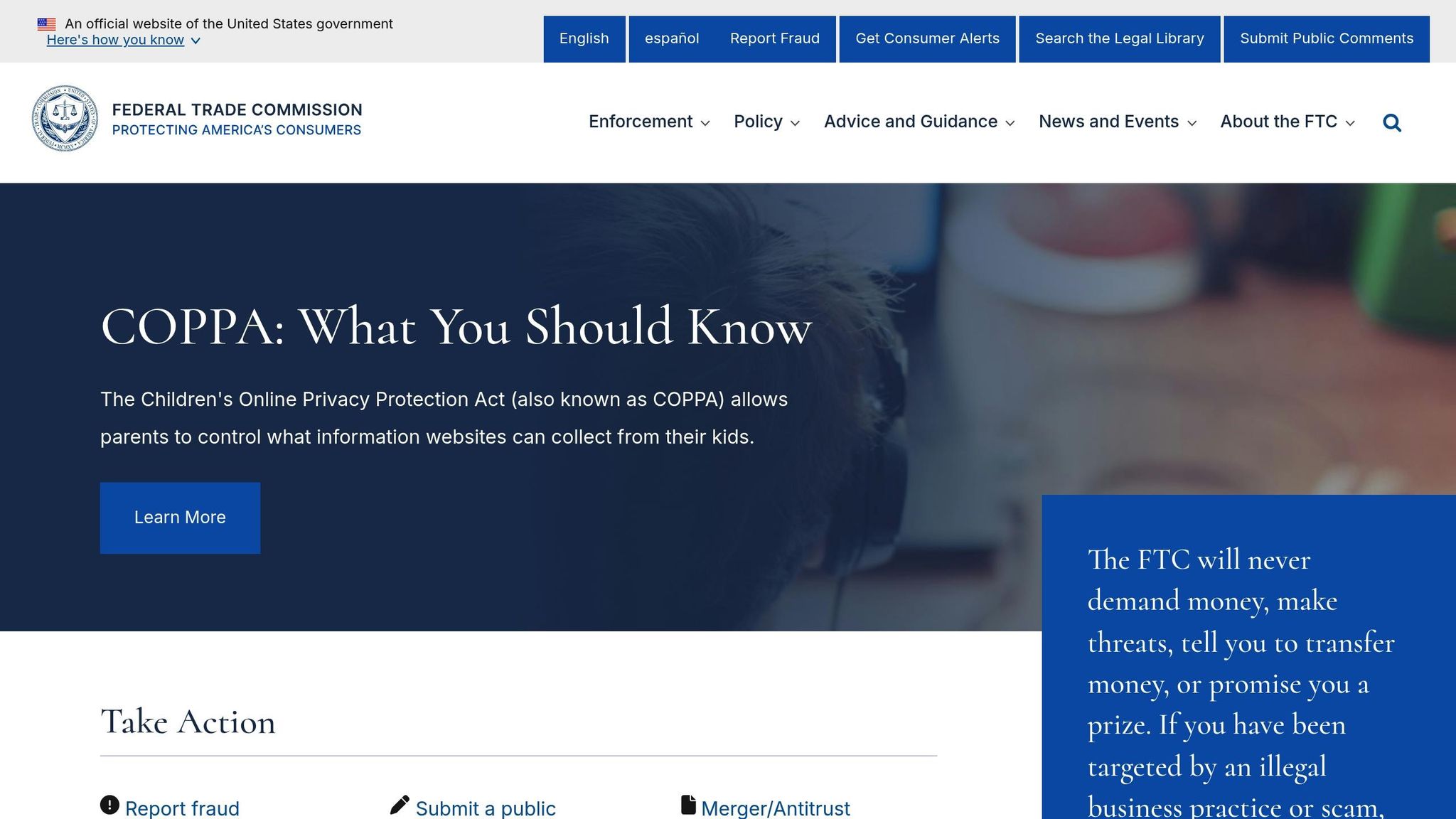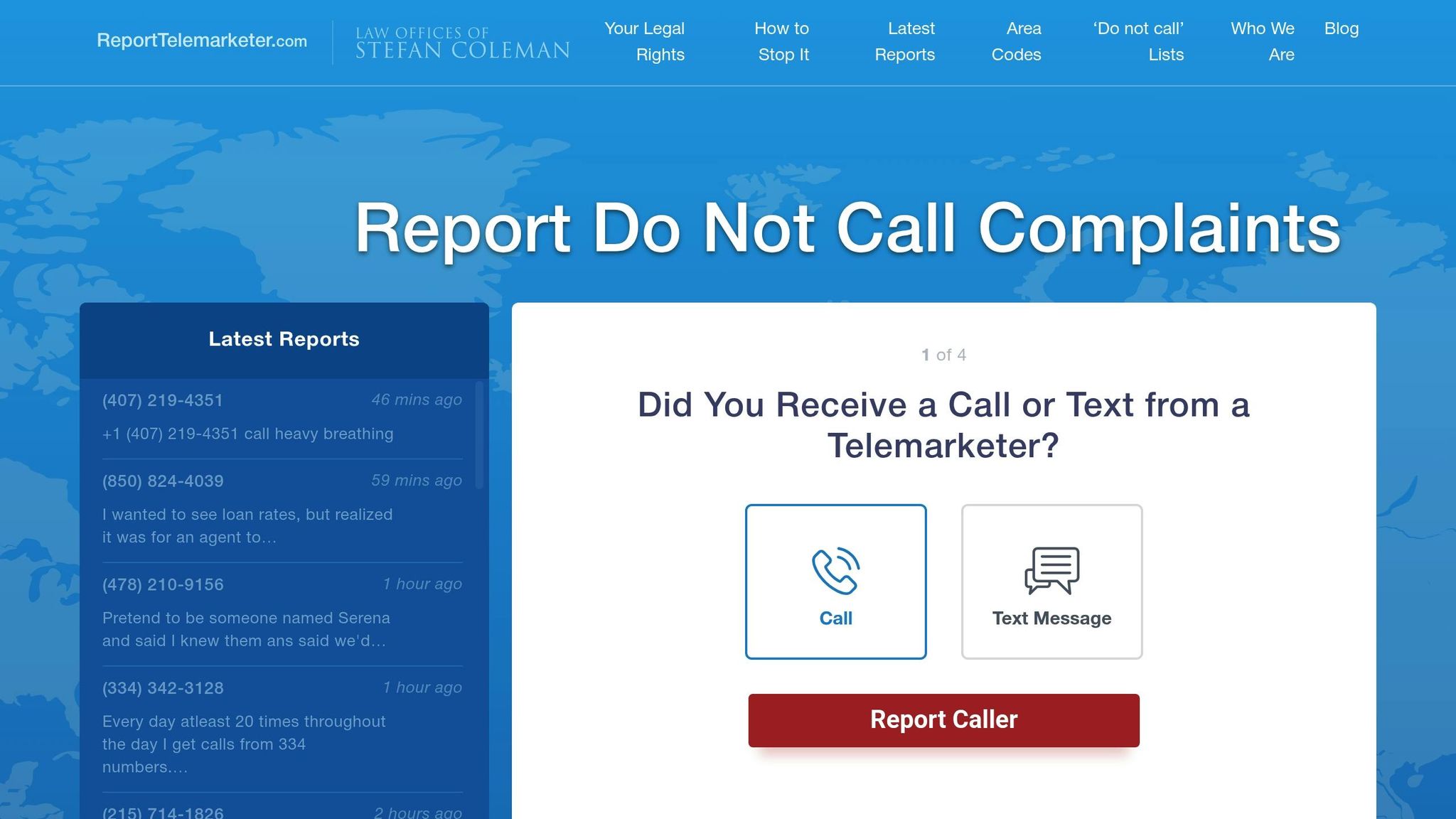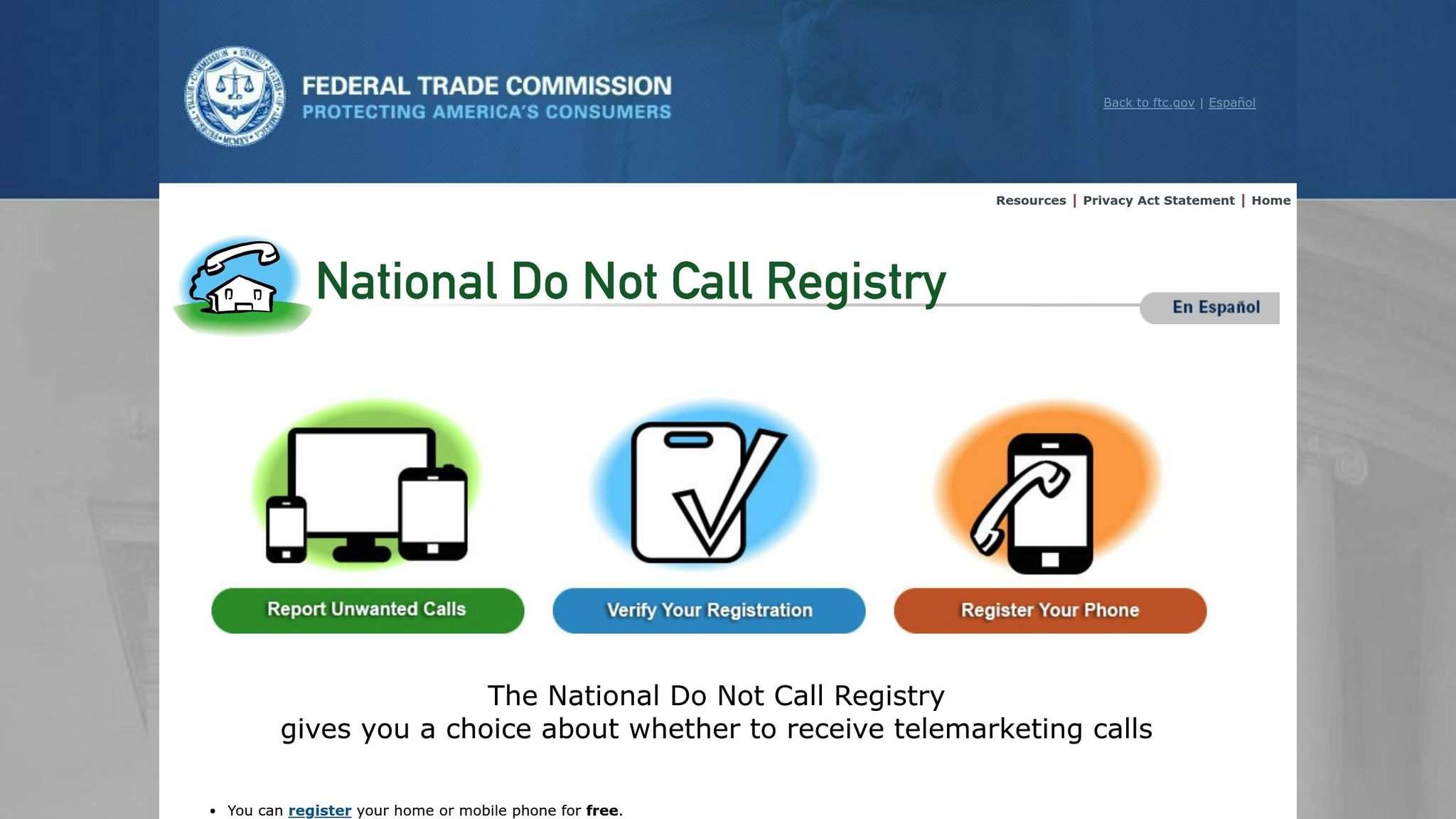
The Do Not Call Registry helps block most telemarketing calls, but some types of calls are legally exempt. Here’s what you need to know:
- Exempt Calls: Nonprofits, political campaigns, charities, business-to-business (B2B) calls, and businesses with an existing relationship can still contact you.
- Rules for Exempt Callers: They must honor opt-out requests, provide accurate caller ID, and follow specific time restrictions (8 a.m. to 9 p.m.).
- Consumer Protection: File complaints with the FTC or use tools like call-blocking apps to reduce unwanted calls.
Even exempt organizations must follow telemarketing laws. Learn how to handle these calls and assert your rights effectively.
Do Not Call List Exemptions
Legal Exemptions
These exemptions are divided into four main categories:
Nonprofit Calls
Nonprofit organizations are not subject to Do Not Call rules but must adhere to certain guidelines:
- Callers must clearly identify themselves.
- Calls are only allowed between 8 a.m. and 9 p.m.
- Organizations must maintain an internal do-not-call list.
Political and Charity Calls
Political campaigns and charitable fundraising efforts are also exempt from Do Not Call Registry restrictions. This includes:
- Calls for campaign outreach.
- Surveys and polls related to political activities.
- Requests for charitable donations.
Business Calls
Business-to-business (B2B) calls are typically not covered under the Do Not Call Registry. This exemption applies to:
| Call Type | Requirements |
|---|---|
| Sales to businesses | Must be directed to business-only lines. |
| Mixed-use lines | Must confirm whether the line is used for business or personal purposes. |
Prior Business Relations
Businesses can contact customers under the "existing business relationship" (EBR) exemption, but only within specific time limits:
- Up to 18 months after a purchase or payment.
- Up to 3 months following an inquiry or application.
However, misuse of this exemption can lead to penalties. For instance, Fluent, LLC faced a $2.5 million fine from the FTC for failing to properly document their use of this exemption.
Rules for Exempt Callers
Even organizations not subject to the Do Not Call Registry must adhere to specific rules to stay compliant with telemarketing laws.
Company Do Not Call Lists
Exempt organizations are required to manage their internal Do Not Call lists with care:
- Keep records for 5 years from the date of the request and update the list monthly.
- Process opt-out requests within 24 hours.
Required Opt-Out Options
Consumers must be provided with clear and simple ways to opt out of future calls. Here’s what’s required:
| Opt-Out Element | Requirement |
|---|---|
| Disclosure Timing | Must be provided during every call. |
| Phone Number | A toll-free number is mandatory. |
| Accessibility | An automated system should be available. |
| Implementation | Requests must be honored within 24 hours. |
Caller ID Rules
Under the Truth in Caller ID Act, telemarketers must display accurate and callable phone numbers. Blocking caller ID information is strictly prohibited.
For mobile calls, stricter rules apply. Exempt organizations must get prior express written consent before using autodialers or prerecorded messages. This applies to all exempt groups, including nonprofits and political campaigns.
"The requirement for accurate caller ID information is non-negotiable, even for exempt organizations. It’s a fundamental consumer protection that ensures accountability in telemarketing practices."
These caller ID rules ensure transparency and accountability, laying the groundwork for enforcement actions covered in the next section.
sbb-itb-a8d93e1
Reporting and Protection Steps
Even though exempt organizations enjoy certain privileges, they must still comply with consumer protection laws.
FTC Complaint Process

The Federal Trade Commission (FTC) manages telemarketing violations through its complaint system. Here’s how you can file a complaint:
- Visit the FTC Complaint Assistant online or call 1-877-FTC-HELP.
- Choose the category: "Unwanted Telemarketing, Text, or SPAM."
- Provide details about the call and submit your complaint.
While the FTC doesn’t resolve individual disputes, your report helps them take action against violators.
Using ReportTelemarketer.com

This platform offers tools to address telemarketing violations:
| Feature | Detail |
|---|---|
| Violation Analysis | Identifies potential legal issues |
| Legal Action | Sends cease-and-desist letters |
| Cost | Free for consumers |
| Records | Tracks and stores case history |
Fines and Penalties
Breaking telemarketing laws can result in heavy fines:
| Violation Type | Maximum Fine |
|---|---|
| Federal Violation | $46,517 per call |
| State Violation | $500-$10,000 per incident |
These penalties also apply to exempt organizations that break the rules. For example, in January 2023, Vonage was fined $100 million for illegal cancellation practices and unauthorized charges. As of 2023, the FTC has pursued 154 cases against more than 500 companies for Do Not Call violations.
To stay protected:
- File complaints with the FTC as soon as possible.
- Use call-blocking tools provided by your phone carrier.
- Report exempt callers to state authorities when necessary.
Summary
The Do Not Call Registry offers strong protections, but knowing the exemptions helps consumers better handle unwanted calls.
Types of Legal Exemptions
Here are the main exemptions to the registry rules:
- Nonprofits: Fully exempt but must maintain their own internal "Do Not Call" lists.
- Political and Charitable Calls: Exempt for outreach and fundraising purposes.
- Existing Business Relationships: Calls are allowed for up to 18 months after a transaction.
- Business-to-Business (B2B): Exempt for communications between business lines.
Even with these exemptions, organizations are still required to adhere to telemarketing rules outlined earlier.
How Consumers Can Take Action
To minimize unwanted calls, take these steps:
- Request to be added to an internal "Do Not Call" list when contacted by exempt organizations.
- Report any violations to the FTC or use call-blocking services.
These measures are most effective when consumers actively assert their rights.
FAQs
What are exceptions to the Do Not Call Registry?

Certain types of calls are exempt from the Do Not Call Registry rules. These include political campaigns, charitable fundraising, surveys, and calls from businesses you already have a relationship with. Even though these are exceptions, callers must still provide accurate caller ID information and respect opt-out requests.
Under what circumstances is there an exemption under the Do Not Call Registry?
Exemptions apply when a business has an existing relationship with a customer or when a consumer has made an inquiry. For example, if you recently bought a car, the dealership might call to offer service plans. However, they must stop contacting you if you ask them to.
Are charities exempt from the Do Not Call List?
Yes, charities are not restricted by the Do Not Call Registry rules. However, they are required to:
- Respect requests to stop calling.
- Only call between 8 a.m. and 9 p.m. local time.
- Clearly identify themselves during calls.
Charities must also offer opt-out options and follow laws regarding robocalls and consent. If you want to stop receiving calls from a specific charity, you can ask to be added to their internal do-not-call list.